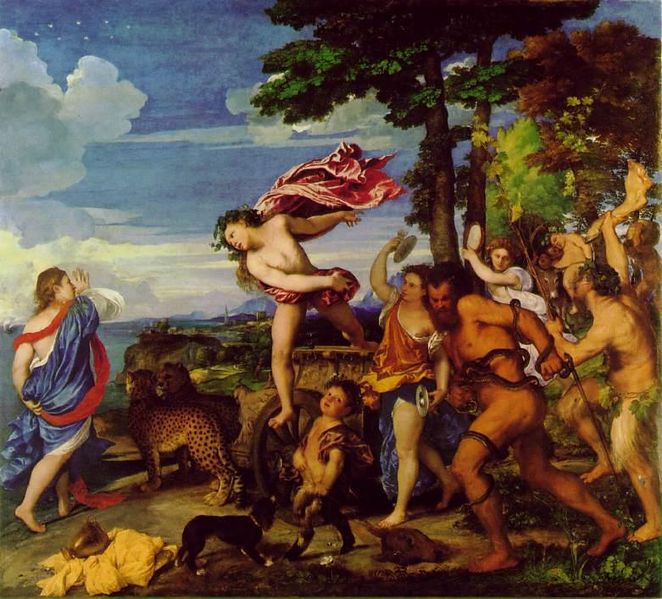
Euripides’ The Bacchae was written 2500 years ago. Given the shape our environment is in, the play is more urgent than ever.
The story involves the nature god Dionysus, who visits Thebes followed by a troupe of dancing women, the Maenads or Bacchae. Dionysus is the product of a union between Zeus and Semele, a Theban woman who, promised anything she wants by the king of the gods, asks to see him in all his glory (the idea has been planted in her mind by Zeus’s jealous wife Hera). Zeus must oblige, Semele is blasted, and Zeus, catching the fetus of Dionysus, sews him into his thigh, and brings him to gestation.
In the play, Semele has been stigmatized by her sisters, who see her explanation (“I was knocked up by Zeus. Honest!”) as an evasion. To punish them for dishonoring his mother, Dionysus has rendered them mad, sending them cavorting into the woods like his followers. He is also directing all Thebes to worship him, through dance and revelry, and two men respond: the blind seer Teiresias and the now-retired ex-king Cadmus, Semele’s father.
But Pentheus, the current king, will have none of it. One can sympathize. He has come back from a trip to find his mother and aunts dancing in the mountains and his grandfather and the city’s seer on the way there. The chief executive office, responsible for general order, feels that all hell is breaking loose.
He squares off with Dionysus, who has taken the shape of a beautiful young man, and of course loses. Dionysus first seduces him into dressing up as a woman to go spy on the women and then gets them to think that Pentheus is a lion. With superhuman strength, the women uproot the tree in which Pentheus is perched and his mother rips off his head. When regular sight returns, Agave is left with the realization of what she has done. When she and Cadmus protest to Dionysus that their punishment has been too severe, he is implacable: “I am a god, and you committed an outrage against me.”
The punishments do seem out of proportion to the crime, but perhaps less so if one sees Dionysus as simply representing a set of consequences—namely, if you mess with nature, nature will get you back. Build your house in a flood plane, pump carbon emissions into the atmosphere, drain the aquifers to water your golf courses, and nature will prove implacable.
On the other hand, honor nature and nature will share its bounties. The Bacchae has enchanting images of nature. Here are the women of Thebes interacting with nature, described by a cowherd who comes across them:
First they let their hair down to their shoulders,
and those who had loosened their fawnskins garments
hitched them up and belted the spotted skins
with snakes that licked their cheeks.
Some of them cradled young gazelles or wolf cubs,
and gave white milk for them to suck.
These were ones who had just given birth,
and their breasts were swollen, their babies left behind.
All crowned themselves with ivy, oak and flowering
vines. One took her thyrsus, struck a rock,
and water leapt out, pure as dew.
Another set her staff in solid ground
and the god sent her a fountain of wine.
If anyone was thirsty for a drink of milk
she scrabbled her sharp fingers in the earth
and it came, spurting white. Sweet streams of honey
too came dripping from the ivy-covered wands.
Our relationship with our own nature is also a theme of the play. When Semele’s sisters function as society’s morality police, condemning her for her sexual indiscretion, Nature will have none of it. Dionysus decrees that the rigid moralists will go off the deep end. It reminds me of those politicians (Governor Mark Sandford of South Carolina, for instance) who self-righteously preach “family values” platforms and then are caught messing around. And of the fact that some of the highest teenage pregnancy rates in our country occur in school districts with just-say-no abstinence-only sexual education programs.
What I find interesting about such people is that, rather than acknowledging a need to question, they just become more strident, as though the force of their assertions will override any arguments and any doubts. Imagine, in the following passage, that Pentheus is blaming the media or rock music or social permissiveness or some such for, say, the outbreak of sexuality in his kingdom—as though the sexual drive is not already a powerful urge already within us:
Track down that foreigner
The one who looks like a girl. He carried this new disease
tour women, put this filth in our bedrooms.
If you catch him, bring him here in chains
so he can pay the penalty—death by stoning—and learn
what a serious crime it is to play Bacchus in Thebes.
From Teiresias’s balanced perspective, this is crazy talk. And yet we hear comparable political prouncements like this on a fairly regular basis in our on society. Here’s what Teiresias says:
Abomination! You haven’t the faintest idea what you are saying!
You’ve become a complete lunatic; this is no temporary madness.
I sometimes feel that lunacy is on the loose in some of the national conversations regarding nature, especially from those who deny global warming. The problem is, if Pentheus remains intransigeant, Nature will ultimately tear us all apart.


One Trackback
[…] situation was foreseen, or at least described, 2500 years ago by the Greek playwright Euripides. In the Bacchae he demonstrates that, if you arrogantly try to impose your will on Nature, Nature will make […]